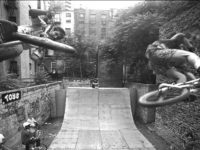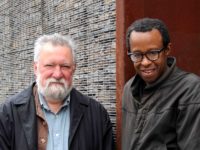feature photo: Anna Yatskevich
The respective histories of two of the most prominent figures of New York’s Downtown scene have a lot of overlap. That overlap between bassist William Parker and pianist Matthew Shipp began around 1989, when saxophone great David S. Ware formed a quartet that included both Parker and Shipp. Not long afterwards, Shipp formed his own small combos with Parker on board and the two also made a couple duet albums in the 90s: Zo (1994) and DNA (1999). Even after Parker eventually departed Shipp’s long-running Trio, the two have continued to collaborate to this day on scores of projects that have involved others.
So why is the new album discussed here called Re-Union? Because it’s been a long while since the two had gotten together to record music with no one else involved.
So while there’s plenty of recent instances of the two playing together, it just isn’t the same as when it’s only these two playing together. Re-Union is a set of four improv pieces that reveals the true extent of unity of purpose and direction that comes from more than three decades of playing together in nearly every imaginable setting. Shipp is heard predominantly on the left channel and Parker the right, making it possible to hear the separation between the two and appreciate the elaborate, instantaneous simpatico they are able to achieve.
Nearly half the album is consumed by “Re-Union,” the song. The percussive aspects of both artists come to the fore and they don’t just operate as a single entity with regards to the harmony but also synergize on the ever-evolving rhythm. Somewhere around the nine-minute mark they reach an intensity rivaling a quartet. When they both play a knotted sequence of notes they do so in a way that complements each other, matching in cadence and — when it makes sense — the same root. They don’t really let up until the closing seconds.
In case you’re wondering when does Parker wield the bow, he does so about a minute into “The New Zo,” which of course transforms the whole complexion of the song, turning it from a mainly staccato footing to a legato one. Parker’s urgent saws inspires Shipp to undertake a classical music direction and rain down dramatic chords at the most impactful moments, both of which he is more than well-suited to do.
Tightly packed notes herald the beginning of “Further DNA” but the rumbling procession doesn’t keep Shipp from introducing melodic ideas along the way. “Song of Two” is introspective and fragile, where the spaces between the notes become ‘notes’ themselves, and both manipulate them to great effect.
William Parker and Matthew Shipp’s Re-Union is now available, courtesy of RogueArt.




